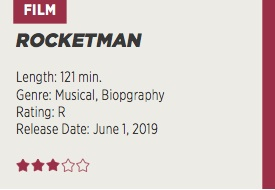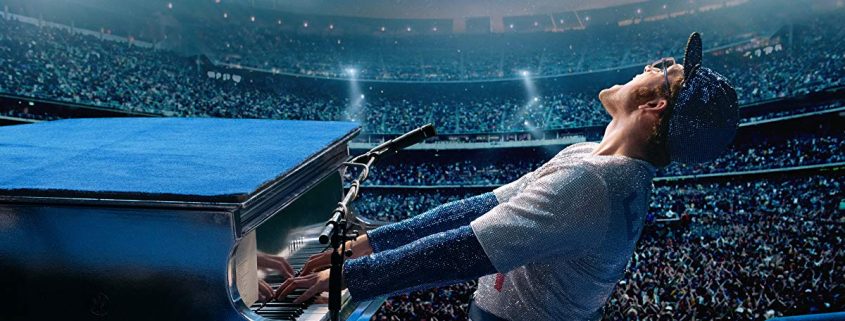REVIEW: ‘Rocketman’ brings delightful take to singer’s biography


“You gotta kill the person you were born to be and become the person you were meant to be,” a singer tells Reginald Dwight in “Rocketman.” Dwight, an aspiring pianist from England playing backup for soul artists, soon decided he needed a stage name. Elton John seemed to have a nice ring to it.
“Rocketman” is based on the true story of singer Elton John’s ascent to stardom. The exciting, unpredictable tone of the entire film is established from the start when Elton, played by Taron Egerton, shows up to an Alcoholics Anonymous meeting wearing a bedazzled devil outfit with feathered wings. Throughout that meeting, Elton shares the story of his life: From troubled childhood to sudden fame.
“Rocketman” is told as a musical. Unlike many music biographies, the film embraces the extravagant style the singer is known for and infuses it into every stylistic choice — turning what could have been a predictable, formulaic tale into an refreshin, empathetic experience.
The story is primarily told through the lens of various important relationships in the singer’s life. As a young and talented pianist, Reginald Dwight used music as a way to feel loved, as he did not have the loving relationship he craved from his father.
However, a crucial relationship Elton developed was with his best friend and collaborator, Bernie Taupin (Jamie Bell). Taupin and Elton hit it off in their very first meeting: After moving in together, Taupin becomes responsible for iconic hits that propel Elton to stardom. Early in their career, when their manager senses they have something Lennon-and-McCartney-esque, they are sent to perform in the U.S. at the Troubadour — a performance the film portrays as ethereal and (literally) groundbreaking. It forever changes their lives.
Egerton is the centerpiece that drives “Rocketman” forward, but the film is also lifted up by its supporting cast. Bryce Dallas Howard portrays Elton’s mother, someone who loves her son but neglects and becomes disappointed in him, namely because he is gay — she argues that he is choosing to lead a lonely life where no one will love him. This interaction is the catalyst for Elton’s increasing drug and alcohol use. He passionately searches for what he cannot find but truly craves: love from another human being.
Another influential character was Elton’s life was his manager John Reid, suavely played by Richard Madden; a wise manager but dishonest lover, Reid helps Elton come to terms with his sexuality. Despite their romantic relationship, Reid constantly has flings with other people on the road, upsetting Elton and making him feel used.
The singer’s tale of love won and lost is heartbreaking — “Rocketman” documents it in a stylistic but melancholic fashion as Elton plummets further into his addictions, anger and despair.
It isn’t until the end of the movie, when he dreams of his friend Bernie telling him that he has always loved him and sees himself hugging a young Reginald Dwight, that Elton finally becomes content with himself. It’s a cathartic conclusion that reveals the most important relationship Elton needed to fix — the one with himself.
Despite its exuberant, musical vibrancy, “Rocketman” does not sugarcoat the icon’s struggles and human imperfections. The film creatively sends a message that love is what everyone deeply craves.

